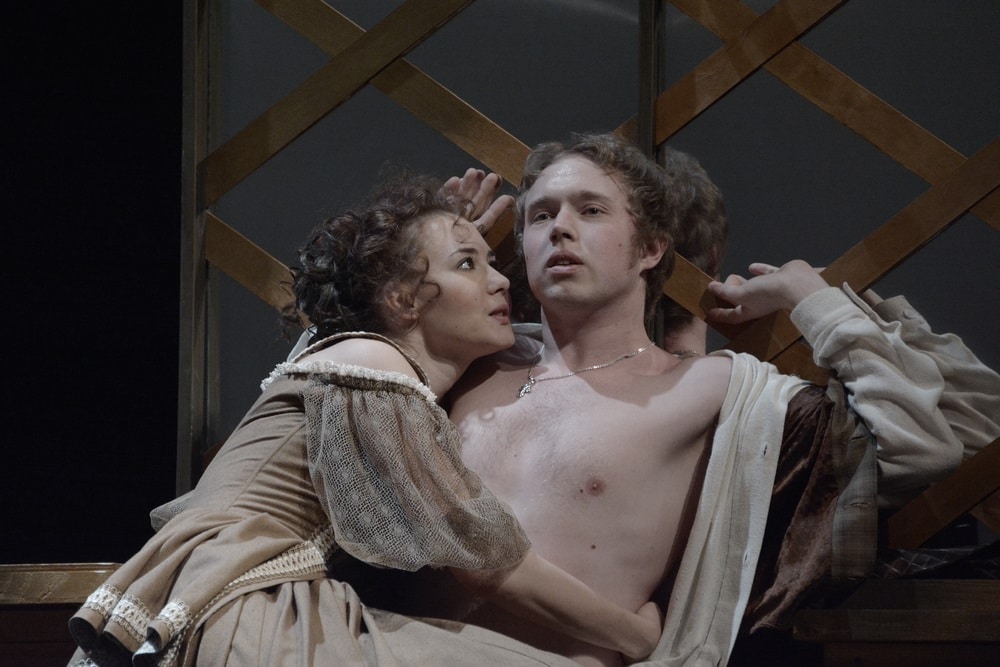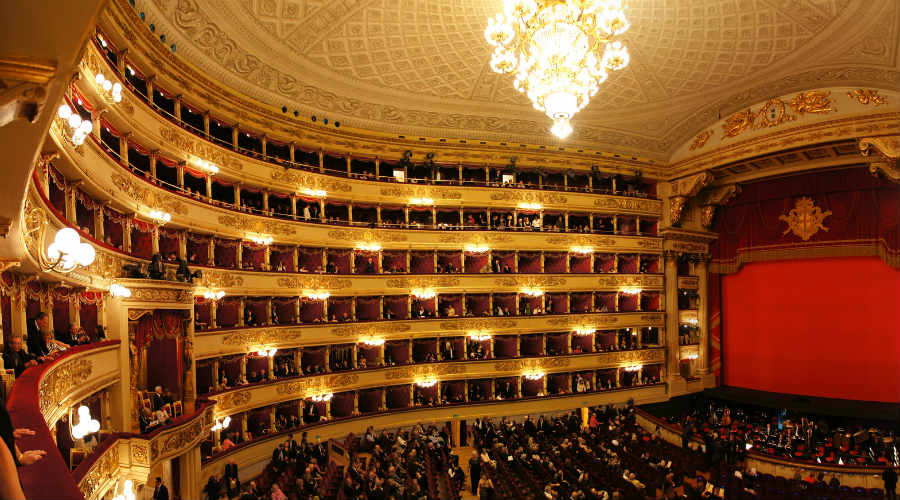
At the very tail end of the 19th Century arrives one of the most discussed and criticized operas. Richard Strauss’s Salomé (Op.54) is a setting of the Oscar Wilde play of the same title from 1891. The play was translated into German from the French original.
DISCLOSURE: This post may contain affiliate links, meaning when you click the links and make a purchase, we receive a commission.
Hedwig Lachmann was the librettist and translator. Salomé is a single-act opera and a first-rate choice for Strauss to have made. Wilde knew how suitable his play was for a musical interpretation.
The 19th-Century Operatic Scandals
Themes of Salomé
In case you are not familiar with the synopsis of Salomé, here is a thumbnail sketch. Salomé is a Princess in the palace of King Herod (Salomé’s stepfather).
The opera opens with Narraboth (Captain of the Guard), gazing longingly at Salomé in the banqueting hall of the palace. Herod imprisoned Jokanaan (The Prophet John The Baptist), whom he was fearful of and forbade anyone to have contact with.
Salomé grows tired of the guests and disappears to see Jokanaan. Only after she works her charm on Narraboth does she see Jokanaan. She is transfixed and full of desire for Jokanaan and tries to touch his skin and hair and eventually tries to kiss him. This is too much for Narraboth, who commits suicide.
As Jokanaan’s voice travels up from his prison casting doubt on the validity of Herod’s marriage to Herodias, Salomé increasingly becomes an object of desire for him. Herod asks Salomé to eat and drink, and twice she refuses.
After more begging from Herod, Salomé agrees to dance for him (The Dance of the Seven Veils) on the condition she is granted her heart’s desire. When the dance is concluded and Salomé lies naked at Herod’s feet, she asks for the head of the Prophet.
Herod attempts to change Salomé’s mind, but eventually, her wish is granted. Salomé declares her love for the severed head and, in a state of complete abhorrence, Herod has Salomé killed.
Censorship of Salomé
Richard Strauss viewed Salomé as simply a “scherzo with a fatal conclusion,” but Salomé produced far more scandal and outcry than the comments of the composer belie.
Firstly, it is a Biblical story, making John the Baptist almost into a comic, ridiculous figure with overt references to incest and homosexuality. The grisly close is too close to being an act of necrophilia for anyone’s comfort.
Despite Mahler’s monumental efforts to persuade the Vienna State Opera to stage Salomé, the Austrian censors refused. Equally, the Metropolitan Opera in New York staged the work for a single night before closing it in 1907.
The reception in England was not much rosier. When the public got wind of the fact that Salomé was to open in London, hundreds of letters were penned in complaint.
Eventually, the Lord Chamberlain banned the Oscar Wilde play, citing it as blasphemous. Strauss was compelled to make significant revisions of Salomé before it was allowed to be staged in many countries.
Composed in 1850, Richard Wagner’s opera Tristan & Isolde courted almost as much of a hullabaloo as Salomé did. Following the initial performance, the opera was slated by many critics and eminent composers alike.
Clara Schumann didn’t pull her punches, describing the work as “the most repugnant thing I’ve ever heard.” Johannes Brahms claimed that a glance at the score would send him into a terrible, dark mood.
Wagner was no fool. He was well aware of the ground-breaking nature of the opera and that his choice of subject could turn people mad.
Overview of Tristan & Isolde
On the other face of the operatic coin, Wagner devotee Friedrich Nietzsche heaped praise on the opera, stating it was “the real opus metaphysicum of all art.”
British composers Edward Elgar and Benjamin Britten were positively effusive about the opera, and Edvard Grieg heaped praise on the work. Even though Tristan & Isolde is what might be classed as a classic love affair, the way Wagner treats the couple is in another realm altogether.
The metaphysical and spiritual worlds are to Wagner the most important components beyond the external world. Through death and only death can the two lovers find true unity. It is richly self-indulgent, some say subversive, but above all, intensely moving.
Wagner’s score and orchestration were too much for some. Alongside Wagner’s unique construction of the whole opera, it was a step towards madness for many first listeners, but it was also the first step towards a completely new operatic world.
Tristan & Isolde broke the operatic mould structurally, harmonically, and literally. From here, opera would never be the same again.
Censorship in 19th Century Opera
To offer another window into the issues that surrounded 19th Century opera, we need to examine what and why censorship played such a key role. Authorities across Europe were only too aware of the power of music.
When that music was coupled to words, then they considered that power to be exponentially more, even with the possibility to corrupt the thoughts of men. Censorship was widely imposed on the operatic world. You can easily understand the concern of those in power once you stage an opera.
The censorship tended to aim at those operas whose content was blasphemous, immoral, or politically charged in the wrong direction. What this meant for composers like Rossini, Schubert, Wagner, and Tchaikovsky, for example, was often nothing short of the semi-destruction of their operas or an outright ban.
With a 21st-century mindset, it can be challenging to understand where all this need for censorship is derived, but the thirst for power is always a demanding and devious drive.
The Marriage of Figaro and Carmen
W.A. Mozart faced similar barriers and objections with his fabulous opera The Marriage of Figaro, and he, like Wagner, knew how controversial the work was likely to be.
Politics then, as now, can’t be easily ignored, and with the French Revolution just around the corner, it is hardly surprising to discover Parisian audiences were late to the party. Today, The Marriage of Figaro is one of the most performed operas across the world.
Georges Bizet’s Carmen from 1872 was composed for the Parisian Comic Opera . This respectable company specialized and prided itself on performing relatively light, if slightly moralistic operas.
Carmen delivers none of the resolutions and stories they would have expected, ending as it does, with murder. Bizet trod on dangerous ground, daring to blatantly display female sexuality at a time when women were often confined to second-class mythological deities.
This explicit opera was something the Parisians could not stomach, and the opera was a complete failure. Like The Marriage of Figaro, Bizet’s Carmen has become one of the most celebrated and performed operas of today.

